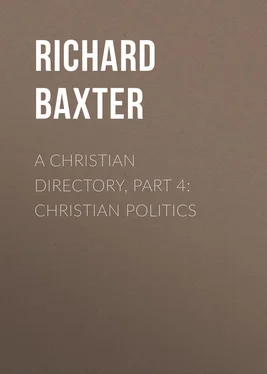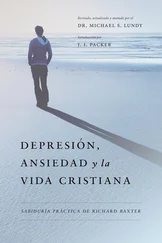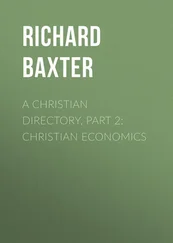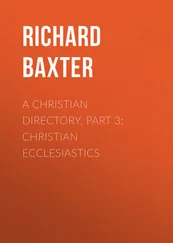Richard Baxter - A Christian Directory, Part 4 - Christian Politics
Здесь есть возможность читать онлайн «Richard Baxter - A Christian Directory, Part 4 - Christian Politics» — ознакомительный отрывок электронной книги совершенно бесплатно, а после прочтения отрывка купить полную версию. В некоторых случаях можно слушать аудио, скачать через торрент в формате fb2 и присутствует краткое содержание. Жанр: foreign_antique, foreign_prose, на английском языке. Описание произведения, (предисловие) а так же отзывы посетителей доступны на портале библиотеки ЛибКат.
- Название:A Christian Directory, Part 4: Christian Politics
- Автор:
- Жанр:
- Год:неизвестен
- ISBN:нет данных
- Рейтинг книги:3 / 5. Голосов: 1
-
Избранное:Добавить в избранное
- Отзывы:
-
Ваша оценка:
- 60
- 1
- 2
- 3
- 4
- 5
A Christian Directory, Part 4: Christian Politics: краткое содержание, описание и аннотация
Предлагаем к чтению аннотацию, описание, краткое содержание или предисловие (зависит от того, что написал сам автор книги «A Christian Directory, Part 4: Christian Politics»). Если вы не нашли необходимую информацию о книге — напишите в комментариях, мы постараемся отыскать её.
A Christian Directory, Part 4: Christian Politics — читать онлайн ознакомительный отрывок
Ниже представлен текст книги, разбитый по страницам. Система сохранения места последней прочитанной страницы, позволяет с удобством читать онлайн бесплатно книгу «A Christian Directory, Part 4: Christian Politics», без необходимости каждый раз заново искать на чём Вы остановились. Поставьте закладку, и сможете в любой момент перейти на страницу, на которой закончили чтение.
Интервал:
Закладка:
Object. But great men have great spirits, and are impatient of reproof, and I am not bound to that which will do no good, but ruin me.
Answ. 1. It is an abuse of your superiors, to censure them to be so proud and brutish, as not to consider that they are the subjects of God, and have souls to save or lose, as well as others: will you judge so hardly of them before trial, as if they were far worse and foolisher than the poor, and take this abuse of them to be an excuse for your other sin? No doubt there are good rulers in the world, that will say to Christ's ministers, as the Prince Elector Palatine did to Pitiscus, charging him to tell him plainly of his faults, when he chose him to be the Pastor Aulicus. 83
2. How know you beforehand what success your words will have? Hath the word of God well managed no power? yea, to make even bad men good? Can you love your rulers, and yet give up their souls in despair, and all for fear of suffering by them?
3. What if you do suffer in the doing of your duty? Have you not learned to serve God upon such terms as those? Or do you think it will prove it to be no duty, because it will bring suffering on you? These reasons savour not of faith.
Direct. XXXV. Think not that it is unlawful to obey in every thing which is unlawfully commanded. It may in many cases be the subject's duty, to obey the magistrate who sinfully commandeth him. For all the magistrate's sins in commanding, do not enter into the matter or substance of the thing commanded: if a prince command me to do the greatest duty, in an ill design, to some selfish end, it is his sin so to command; but yet that command must be obeyed (to better ends). Nay, the matter of the command may be sinful in the commander, and not in the obeyer. If I be commanded without any just reason to hunt a feather, it is his sin that causelessly commandeth me so to lose my time; and yet it may be my sin to disobey it, while the thing is lawful; else servants and children must prove all to be needful, as well as lawful, which is commanded them before they must obey. Or the command may at the same time be evil by accident, and the obedience good by accident, and per se . Very good accidents, consequence, or effects, may belong to our obedience, when the accidents of the command itself are evil. I could give you abundance of instances of these things.
Direct. XXXVI. Yet is not all to be obeyed that is evil but by accident, nor all to be disobeyed that is so: but the accidents must be compared; and if the obedience will do more good than harm, we must obey; if it will evidently do more harm than good, we must not do it. Most of the sins in the world are evil by accident only, and not in the simple act denuded of its accidents, circumstances, or consequents. You may not sell poison to him that you know would poison himself with it, though to sell poison of itself be lawful. Though it be lawful simply to lend a sword, yet not to a traitor that you know would kill the king with it, no nor to one that would kill his father, his neighbour, or himself. A command would not excuse such an act from sin. 84He was slain by David, that killed Saul at his own command, and if he had but lent him his sword to do it, it had been his sin. Yet some evil accidents may be weighed down by greater evils, which would evidently follow upon the not doing of the thing commanded.
Direct. XXXVII. In the question, whether human laws bind conscience, the doubt is not of that nature, as to have necessary influence upon your practice. For all agree, that they bind the subject to obedience, and that God's law bindeth us to obey them. And if God's law bind us to obey man's law, and so to disobey them be materially a sin against God's law, this is as much as is needful to resolve you in respect of practice: no doubt, man's law hath no primitive obliging power at all, but a derivative from God, and under him; and what is it to bind the conscience (an improper speech) but to bind the person to judge it his duty, ( conscire ,) and so to do it. And no doubt but he is bound to judge it his duty, that that is immediately by human law, and remotely by divine law, and so the contrary to be a sin proximately against man, and ultimately against God. This is plain, and the rest is but logomachy.
Direct. XXXVIII. The question is much harder, whether the violation of every human penal law be a sin against God, though a man submit to the penalty. (And the desert of every sin is death.) Master Richard Hooker's last book unhappily ended, before he gave us the full reason of his judgment in this case, these being the last words: "Howbeit, too rigorous it were, that the breach of every human law should be a deadly sin: a mean there is between those extremities, if so be we can find it out – ." 85Amesius hath diligently discussed it, and many others. The reason for the affirmative is, because God bindeth us to obey all the lawful commands of our governors; and suffering the penalty, is not obeying; the penalty being not the primary intention of the lawgiver, but the duty; and the penalty only to enforce the duty: and though the suffering of it satisfy man, it satisfieth not God, whose law we break by disobeying. Those that are for the negative, say, That God binding us but to obey the magistrate, and his law binding but aut ad obedientiam, aut ad pœnam , I fulfil his will, if I either do or suffer: if I obey not, I please him by satisfying for my disobedience. And it is none of his will, that my choosing the penalty should be my sin or damnation. To this it is replied, That the law bindeth ad pœnam , but on supposition of disobedience; and that disobedience is forbidden of God: and the penalty satisfieth not God, though it satisfy man. The other rejoins, That it satisfieth God, in that it satisfieth man; because God's law is but to give force to man's, according to the nature of it. If this hold, then no disobedience at all is a sin in him that suffereth the penalty. In so hard a case, because more distinction is necessary to the explication, than most readers are willing to be troubled with, I shall now give you but this brief decision. 86There are some penalties which fulfil the magistrate's own will as much as obedience, which indeed have more of the nature of a commutation, than of penalty: (as he that watcheth not or mendeth not the highways, shall pay so much to hire another to do it: he that shooteth not so oft in a year, shall pay so much: he that eateth flesh in Lent, shall pay so much to the poor: he that repaireth not his hedges, shall pay so much:) and so in most amercements, and divers penal laws; in which we have reason to judge, that the penalty satisfieth the lawgiver fully, and that he leaveth it to our choice. In these cases I think we need not afflict ourselves with the conscience or fear of sinning against God. But there are other penal laws, in which the penalty is not desired for itself, and is supposed to be but an imperfect satisfaction to the lawgiver's will, and that he doth not freely leave us to our choice, but had rather we obeyed than suffered; only he imposeth no greater a penalty, either because there is no greater in his power, or some inconvenience prohibiteth; in this case I should fear my disobedience were a sin, though I suffered the penalty. (Still supposing it an act that he had power to command me.)
Direct. XXXIX. Take heed of the pernicious design of those atheistical politicians, that would make the world believe, that all that is excellent among men, is at enmity with monarchy, yea, and government itself; and take heed on the other side, that the most excellent things be not turned against it by abuse.
Here I have two dangers to advertise you to beware: the first is of some Machiavelian, pernicious principles, and the second of some erroneous, unchristian practices.
Читать дальшеИнтервал:
Закладка:
Похожие книги на «A Christian Directory, Part 4: Christian Politics»
Представляем Вашему вниманию похожие книги на «A Christian Directory, Part 4: Christian Politics» списком для выбора. Мы отобрали схожую по названию и смыслу литературу в надежде предоставить читателям больше вариантов отыскать новые, интересные, ещё непрочитанные произведения.
Обсуждение, отзывы о книге «A Christian Directory, Part 4: Christian Politics» и просто собственные мнения читателей. Оставьте ваши комментарии, напишите, что Вы думаете о произведении, его смысле или главных героях. Укажите что конкретно понравилось, а что нет, и почему Вы так считаете.












